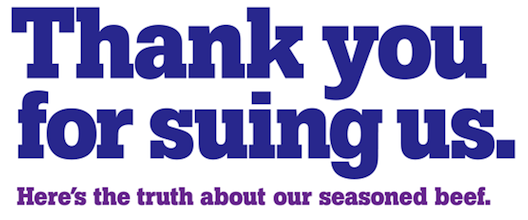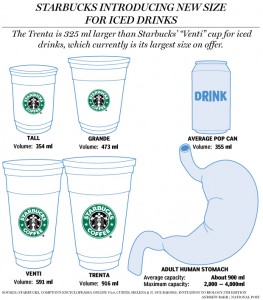Or is it eat first, sue later? Since when have we become a nation of individuals who doesn’t question almost any of the foods we consume even though we live with technology at our fingertips? Are we somehow comforted by the site of a fast food wrapper due to sheep mentality knowing so many others are eating the same thing? And it’s not just food. 75 percent of children drink caffeine daily, according to a new study published in the most recent issue of the Journal of Pediatrics. In a study of 201 children, originally designed to look at bed-wetting among kids between the ages of 5 and 12, doctors found that like adults, the more caffeine kids drank – usually from soda – the less sleep they got. Children in the study between 5 and 7-years-old drank 52 milligrams of caffeine a day – or the equivalent of more than about 16-ounces of Coca-Cola. Kids between 8-and 12-years-old in the study drank more than twice that, gulping down 109 milligrams of caffeine a day. The increase in caffeine may even be linked to the dramatic rise in type 2 diabetes if you check just one of the side effects of caffeine.
And while we don’t research what is in the fast, junk or highly processed foods and drinks many of us buy for our families, ironically, there are things that we as parents do tremendous research on prior to feeding our children any of it. No, not “side effects of foods that contain additives, stimulants. chemicals, synthetics, pesticides, or even arsenic.” And not either the side effects to the “additives, stimulants. chemicals, synthetics, pesticides or arsenic.” “What most of us as parents Google, searching for any type of side effect, ask the pediatrician’s permission to feed to our children, are for foods and the nutrients in them that are well known in research to not only nourish, but benefit the human body. Don’t get me wrong, I’m all for sharing with our children’s doctor. But aren’t we being a bit hypocritical when we feed our child a Krispy Kreme doughnut without searching for any side effects of high levels of saturated fat and sugar, and checking with the pediatrician? Why have we become more hesitant about food that contains essential nutrients? This includes essential fatty acids (such as fish oils) and essential amino acids and nutrients from natural foods (such as Nutriiveda or NV). Perhaps this is the root of today’s health issues, our disconnect to good nutrition. And while the numbers of overweight and obese continue to rise where it now includes 1/3 of our children, we are undernourished at the same time. Perhaps this is why we have found through both parental and professional anecdotal feedback tremendous surges for various neurological conditions by adding essential nutrients to the diet. We are just providing the body with what may have been lacking. and what was essential.
“What is an essential nutrient?”
An essential nutrient is one that is essential for life, but the body can’t produce it so it needs to be consumed. Problem is today’s diets are deficient in many of the essential nutrients. On top of deficient diets is damage to the metabolic and adrenal systems sometimes from poor diets and added chemicals to today’s foods. More and more today, the body can’t properly digest and utilize the essential nutrients needed. What we eat and feed our children should matter and we should at least be educated consumers; and not just for healthy foods, for all foods.
Mitochondrial Dysfunction in Autism and Other Disorders, Can Diet Help?
While we know an essential nutrient is essential for human life, chemicals, synthetics, stimulants and preservatives are not essential and some can be detrimental to human life. According to the Center for Science in the Public Interest (CSPI) website:
“Shopping was easy when most food came from farms. Now, factory-made foods have made chemical additives a significant part of our diet.”
In general, it’s best to avoid the following ingredients.
* Sodium nitrite
* Saccharin, Aspartame, Acesulfame-K
* Caffeine
* Olestra
* Food Dyes
Starbucks may want to take note of lawsuits such as this Taco Bell lawsuit in regards to their new 31 ounce Trenta that is not only equal to four cups of coffee but according to the National Post
“ the Trenta’s 916 millilter size is larger than the human stomach’s “average” 900 milliliter capacity. … “about a quarter of the volume it could take to rupture your stomach.”
So it’s my opinion that if you drive into a fast food restaurant looking for food like mom used to make, you may instead just want to go to mom’s house.
=====
Written by Lisa Geng, mother to two boys that were both “late talkers” who are doing great today. President and Founder of the Cherab Foundation, and Co Author of The Late Talker book St Martin’s Press

